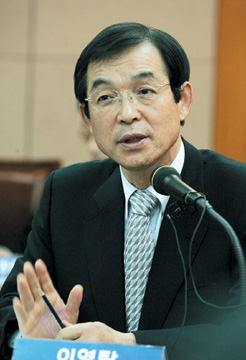Rapid Rise toward New Highs
KOSPI Index breaks through 2,000 mark on July 25 for first time in history
 On July 25, KOSPI broke the 2,000 mark since breaking the 1,000 mark in 2 years and 5 months ago, recording 2,004.22 with the daily rise of 0.6 percent in the index. With the record index rise, the stock market value rose to 996.5 trillion won, a new record. The hot stock market achieved the 2,000 mark since it reached the 1,900 mark just 13 days ago based on only 8 working days of the bourse.
On July 25, KOSPI broke the 2,000 mark since breaking the 1,000 mark in 2 years and 5 months ago, recording 2,004.22 with the daily rise of 0.6 percent in the index. With the record index rise, the stock market value rose to 996.5 trillion won, a new record. The hot stock market achieved the 2,000 mark since it reached the 1,900 mark just 13 days ago based on only 8 working days of the bourse.
The market value amounted to 469.4 trillion won when the landmark index hit 1,011.36 on May 28, 2005, for the first time in the market's history, but the value almost doubled when it hit over 2,000 points on July 25.
The record rise can be explained from the fact that deposits in securities firms amounted to 15.4 trillion won on July 23, up 4.9 trillion won from 10.5 trillion won on Feb. 28, 2005 and share-type funds amounted to 71 trillion won on July 23, up 61.3 trillion won from Feb. 28, 2005, when it has only 9.7 trillion won.
On July 25, the finance industry shares all others in value while it was electric and electronic shares on Feb. 2005, which took second place on July 25 followed by transportation equipment industry shares in third place with chemical and iron, steel and metal shares in fifth place. On February, 2005, finance industry shares took second followed by shares of chemical industry in third place, trans. Equipment in fourth and communication shares in fifth.
During Feb. 28, 2005 and July 25, July 2007, institutional investors net buying amounted to 15.17 trillion won, while foreign investors net sales amounted to 18.9 trillion won followed by individual investors'net sales recorded 7.8 trillion won.
The significance of the stock index rise to over 2,000 points is the opening of investment age and expansion of the indirect investment culture in the country, Korea Exchange officials said.
They also said baby boomers took over the main stream of stock investors and also attributed the steep rise in stock market index to mid-aged people changing to investment from savings in preparing for their retirement period.
 Investments in shares and bonds amounted to 261 trillion won as of July 23, compared to 138 trillion won at the end of 2000.
Investments in shares and bonds amounted to 261 trillion won as of July 23, compared to 138 trillion won at the end of 2000.
The corporate restructuring has been fully implemented following the foreign exchange crisis focused on strengthening management and shareholders. Debt ratio averaged only 85 percent for listed companies at the end of 2006 from 340 percent from the end of 1997, when the crisis broke out. ROE rose to 12 percent on average from minus 6 percent during five years before 2002. Dividends paid amounted to 3.8 trillion won by 306 listed firms in 2001, but it rose to 11.7 trillion on in 2006 from 427 companies.
Also, a number of global companies emerged like Samsung Electronics, POSCO, and Hyundai Heavy Industries with steady rises in exports. It rose to $325.5 billion in 2006 from $172.3 billion in 2000.
The high stock index also means that the Korea discount, a practice in the international financial market, to charge higher interest rates on loans provided to Korea due to various conditions special to Korea, including risks factors posed by North Korea's nuke programs. The six-party talks agreement on Feb. 13 and improved North Korea's relations with the U.S. somewhat softened the Korea discount factors. Also contributing to easing the factors was the conclusion of the free trade agreement with the U.S. in April, which is considered to provide a new growth base for the Korean economy when it comes into effect. Moody's upgrading of Korea's sovereign credit ratings has also softened the Korea discount factors recently as it has changed the global perception of the Korean economy.
PER of the Korean stock market continues to be rated lower than its real PER standing at 12.6 as of July 20, against 19.9 for the U.S. stock exchange, 22.6 for Japan, 24.7 for Hong Kong and 25.8 for China and 15.3 for Singapore.
The Capital Markets Consolidation Act which passed parliament in July 3 is projected to bring a huge growth base for financial investment market, ushering in the age of the emergence of large investment banks in Korea, paving the way for the financial industry to make a greater contribution to the growth of the economy like manufacturing industry has been doing. Enough liquidity around the world due mostly to the low interest rates in Japan and the U.S. would keep the stock markets around the world to rise in value. Already 32 of the 43 countries with stock markets saw their indices rise to the highest level in their histories. nw
(photo right) KRX President Lee Yong-tak. A scene of the trading room at KRX.
3Fl, 292-47, Shindang 6-dong, Chung-gu, Seoul, Korea 100-456
Tel : 82-2-2235-6114 / Fax : 82-2-2235-0799